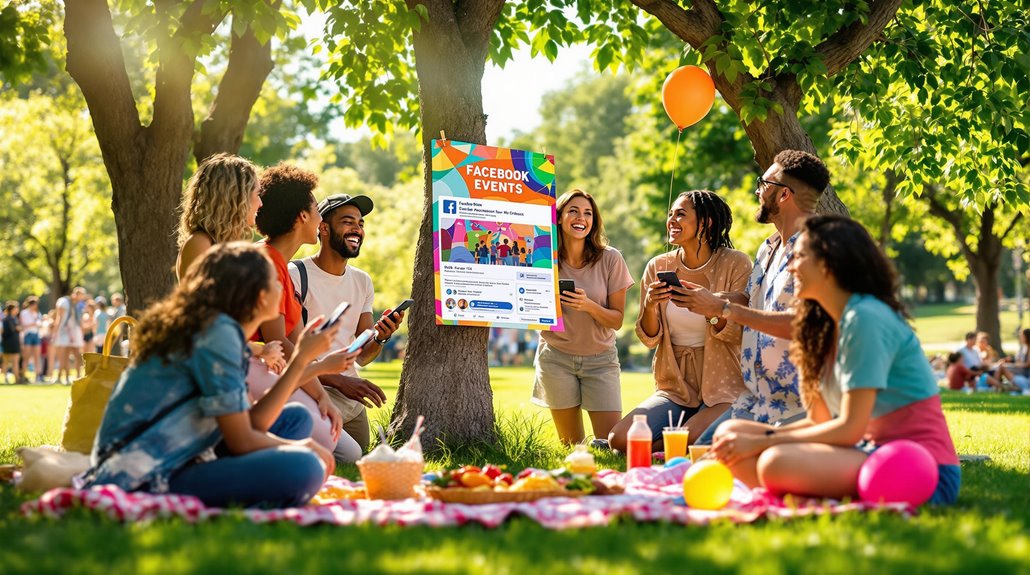To attract more attendees to your Facebook events, start by creating an eye-catching event page with a unique name and detailed information, including location, date, and activities. Use high-quality visuals to grab attention and craft compelling descriptions filled with relevant keywords. Promote your event through engaging posts and Facebook ads targeted to specific demographics, ensuring your messaging speaks to your audience’s interests. Facilitate interaction by hosting live sessions or polls, and maintain engagement post-event by sharing highlights and gathering feedback. By implementing these strategies, you can enhance attendance and create a thriving community around your events. More insights await you.
Briefly keys
- Create a unique and memorable event name along with comprehensive details to attract potential attendees effectively.
- Promote the event through engaging storytelling and utilize share buttons to encourage attendees to spread the word.
- Leverage Facebook’s advertising options to target specific demographics for broader reach and better engagement.
- Engage your audience with live interactions, polls, and Q&A sessions to foster excitement and anticipation.
- Maintain post-event engagement by sharing highlights and gathering feedback to build a loyal community for future events.
Creating an Effective Event Page
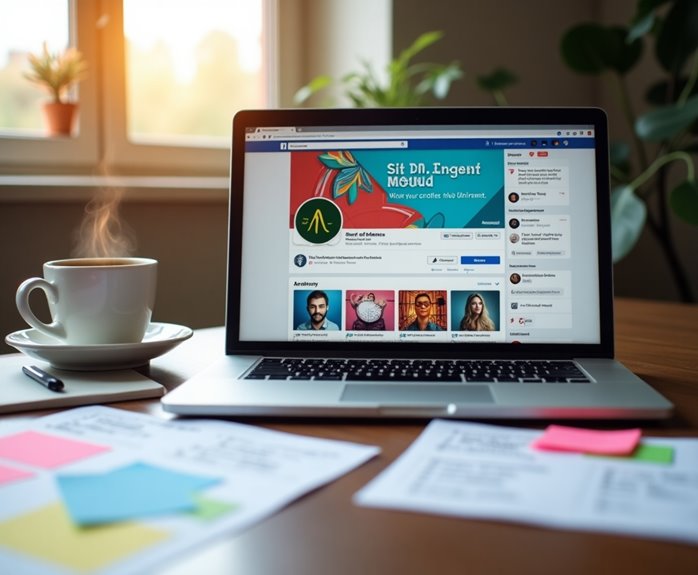
When planning an event, it’s essential to create an effective event page that captures attention and provides crucial information. Start with a unique event name that makes your gathering memorable.
Next, detail the event specifics, including location, start and end times, and the date, ensuring that potential attendees have all the necessary event details at their fingertips. Selecting the appropriate event type will help categorize your event and reach the right audience, while linking to the venue’s Facebook page can offer a dynamic map for easy navigation.
An engaging event cover photo or video will visually attract attendees, so choose something that reflects the event’s theme.
In your event description, be thorough, detailing activities, food options, and entertainment to entice participants. Additionally, using relevant keywords in the tags section enhances discoverability on Facebook. Don’t forget to choose a suitable category related to your event’s theme, as this aids in user searches. Furthermore, consider that Facebook marketing remains effective for engaging a large audience, particularly for event promotion.
Lastly, consider adding other hosts to your event page; this can help manage the event and extend your reach.
Optimizing and Promoting Your Event
Optimizing and promoting your event is essential for attracting attendees and guaranteeing its success. Start by crafting engaging and shareable content that highlights key features of your event, such as new speakers or unique activities. Use eye-catching visuals and catchy headlines, along with concise descriptions, to boost shareability.
Incorporate storytelling techniques that resonate with your audience’s aspirations, sharing narratives about how your event has positively impacted individuals in the past. Understanding Your Audience allows you to tailor your messaging to better connect with potential attendees.
Regularly post event updates and behind-the-scenes content to generate excitement, utilizing Facebook Events to create and schedule these posts. Encourage social sharing by including prominent share buttons and creating an official event hashtag, making it easy for attendees to promote your event within their networks.
Consider leveraging Facebook’s advertising options, such as boosted event posts or carousel ads, to reach a wider audience. Confirm your ads target specific demographics and interests, aligning them with campaign goals like increasing attendance or driving ticket sales.
Utilizing Facebook Features
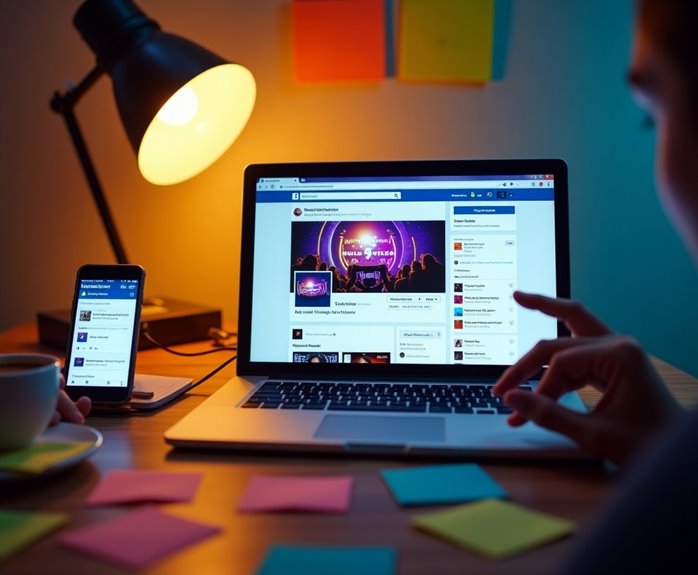
Maximizing your event’s potential goes beyond just promoting it; it involves making the most of Facebook’s interactive features. Start by utilizing location maps, which allow attendees to easily navigate to your event venue. This feature eliminates confusion and encourages attendance by providing clear directions.
During your event, engage participants with live comments and polls. These tools foster real-time interaction, allowing attendees to share their thoughts and experiences instantly. Additionally, leveraging the platform’s vast audience can significantly increase your event’s visibility and attract more attendees.
Consider scheduling Facebook Live sessions to build anticipation, offering valuable insights and encouraging viewer interaction through comments and questions. A social wall can also enhance engagement. Encourage attendees to post pictures and comments, creating a lively community atmosphere. Behind-the-scenes content keeps interest high, giving potential attendees a glimpse of what to expect.
Finally, remember to actively respond to comments and messages on your event page to build trust and encourage further interaction. By effectively using these Facebook features, you can create a dynamic and engaging experience that not only attracts more attendees but also enhances their overall event experience.
Running Targeted Ad Campaigns
Harnessing the power of targeted ad campaigns can greatly enhance your event’s visibility and attendance. By effectively utilizing audience segmentation, you can guarantee that your ads reach the right people.
Start by defining your ad budget and then select targeting options based on location, demographics, interests, and behaviors. For example, if your event caters to tech enthusiasts, target users interested in technology and related topics. It’s important to remember that 67.7% of companies utilize Facebook for marketing, highlighting its effectiveness in reaching potential attendees.
When creating your ads in Meta Ads Manager, focus on attention-grabbing visuals and clear information about your event, including dates and location. Use compelling call-to-action buttons like “Get Tickets” to drive engagement.
Additionally, you can set up A/B testing to optimize your ads for better performance, allowing you to see what resonates with your audience.
Monitor engagement metrics closely to gauge the success of your campaigns. If certain segments aren’t responding well, adjust your targeting to better align with user interests.
You can also expand your reach by allowing detailed targeting expansion, which broadens your audience without sacrificing relevance. Remember, consistent monitoring and optimization are key to maximizing the impact of your targeted ad campaigns.
Engaging Attendees Before and After
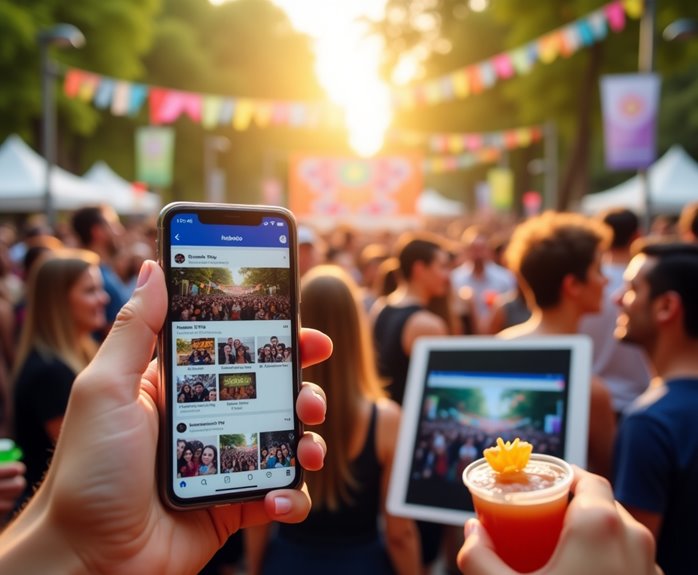
Engaging attendees before and after your event is essential for building excitement and fostering a sense of community. A solid pre-event strategy can greatly enhance attendee engagement.
Start by utilizing polls and questions to gather insights on session topics or speaker preferences, which encourages discussions and boosts interest. Consider hosting Facebook Live sessions for Q&As or sneak peeks, allowing you to share real-time updates and create anticipation.
Creating private groups on Facebook fosters networking and community among attendees, where they can share thoughts, ask questions, and discuss relevant content prior to the event. Regular updates on speakers and features keep your audience informed, ensuring they feel involved. Additionally, leveraging user-generated content can significantly enhance audience engagement by encouraging attendees to share their experiences or tips using a designated event hashtag, which can increase visibility and engagement.
After the event, maintain the connection by sharing highlights and encouraging attendees to reflect on their experiences. Use Facebook Event Insights to monitor engagement, adjusting your strategies to enhance future events.
Continuous Promotion Strategies
Continuous promotion strategies are vital for maintaining interest in your event and guaranteeing a steady flow of attendees. Regular posting is imperative, so create a content schedule that includes teaser posts, event updates, and behind-the-scenes content. This approach keeps your audience engaged by generating buzz months before the event, creating a sense of exclusivity and anticipation.
Encourage user-generated content by prompting attendees to share their own experiences, photos, and testimonials, which can further enhance engagement. Additionally, consider targeted advertising to reach specific demographics, interests, and behaviors. Set clear goals and a realistic budget for your Facebook ads, and continuously optimize their performance using Facebook’s Ads Manager to track key metrics.
Leverage social sharing by incorporating share buttons on your event page and incentivizing attendees to spread the word through discounts or giveaways. Utilizing Facebook features like Facebook Live can also heighten audience engagement, allowing you to host interactive sessions that connect with potential attendees.
Finally, use content scheduling to guarantee timely reminders and countdown posts, which help build anticipation as the event date approaches. Implementing these strategies will notably boost your event’s visibility and attendance.
Analyzing and Refining Your Approach
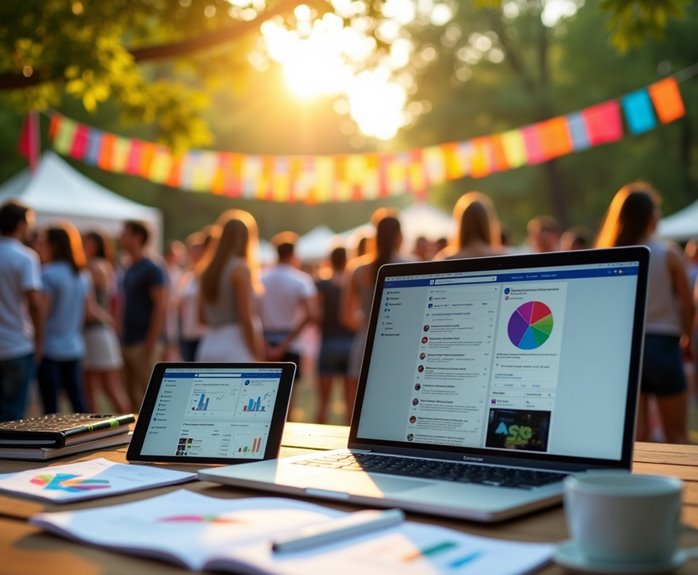
Analyzing and refining your approach to Facebook Events is essential for maximizing attendance and engagement. By using event analytics effectively, you can identify what works and what doesn’t.
Start by diving into Facebook Event Insights to gain a clearer understanding of your audience and their interactions. Here are four key steps to reflect upon:
- Track Engagement Metrics: Monitor likes, comments, and shares to see what content resonates most with your audience. Additionally, tracking event performance can provide valuable insights into which aspects of your event are most engaging.
- Optimize Event Descriptions: Craft compelling descriptions that highlight unique features and include relevant keywords to boost discoverability.
- Enhance Visual Quality: Use high-quality images and videos that reflect your event’s theme, as engaging visuals attract more attendees.
- Refine Targeting Strategies: Utilize custom and lookalike audiences based on past engagement, along with demographic and geotargeting, to reach a more relevant audience.
People are Asking
Can I Create a Facebook Event Without a Business Page?
Yes, you can create events using your personal profile. Just set up the event details and share it within your network. It’s straightforward and perfect for small gatherings or personal events without needing a business page.
How Can I Change the Event Date After It’s Created?
To change the event date after it’s created, access your event management settings, select the “Edit” option, and make your date adjustment. Don’t forget to save changes for attendees to receive updates!
What Should I Do if My Event Gets Canceled?
If your event gets canceled, don’t panic. Use event rescheduling tips and effective attendee communication strategies to explain the situation clearly. Keep guests informed to maintain their interest for future events.
Can I Collaborate With Other Pages for My Event?
Yes, you can collaborate with other pages for your event. By utilizing event partnerships and cross promotion strategies, you’ll enhance visibility and reach, engaging broader audiences and increasing your event’s overall appeal and attendance.
Is There a Limit to the Number of Guests I Can Invite?
There isn’t a strict limit on guest invitations, but effective invitation strategies help manage attendance. Consider guest limits while inviting people, ensuring you maintain a comfortable event atmosphere and encourage engagement among attendees.
Wrapping up
By applying these strategies—creating a compelling event page, optimizing promotion efforts, leveraging Facebook’s features, targeting ads, and engaging attendees—you can greatly boost your event’s attendance. Remember, it’s more than simply throwing a virtual party and hoping for the best; it’s about strategically crafting an experience that draws people in. So, roll up your sleeves and get to work, because the only thing worse than a poorly attended event is sitting alone in your living room wondering where everyone went.

